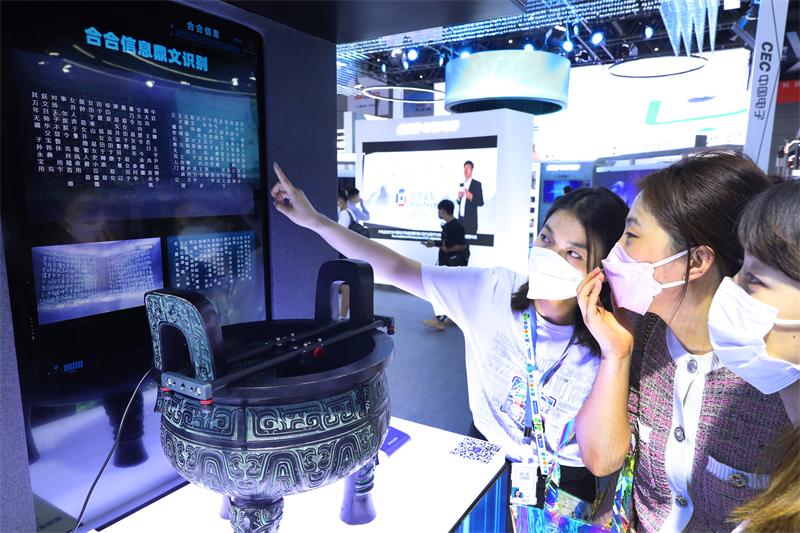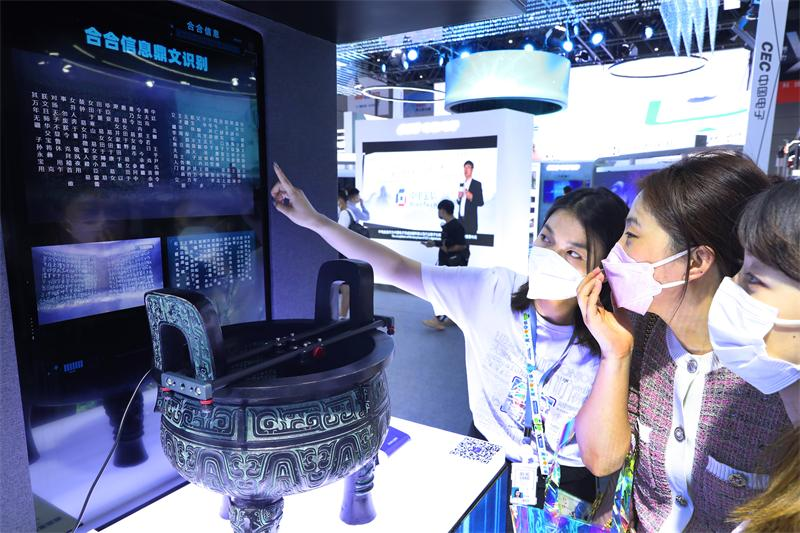
A staff member introduces an AI character recognition system to visitors at the 2022 World Artificial Intelligence Conference (WAIC) in east China's Shanghai, Sept. 1, 2022. (Xinhua/Fang Zhe)
BEIJING, Sept. 8 (Xinhua) -- China's smart economy empowered by artificial intelligence (AI) has logged rapid expansion in recent years, with its scale increasing rapidly.
The deep integration of AI with the real economy has injected strong impetus into high-quality development.
The continuous introduction of favorable policies and the deepening of opening-up will help usher in rosy prospects for AI technology innovation and industrial application.
-- Strong development momentum
In recent years, China's smart economy has flourished with larger scale. In 2021, the total scale of the country's core AI industries exceeded 400 billion yuan, over six times higher than that in 2019. In a broad sense, the scale of China's digital economy reached 45.5 trillion yuan in 2021, up from 27.2 trillion yuan in 2017 and ranking the second in the world.
Yu Xiaohui, president of China Academy of Information and Communications Technology, held it that a good facilities network, huge market demand and burning enthusiasm for innovation nurture strong impetus for the growth of the digital economy in China.
First, China has built the world's largest network infrastructure. It is home to more than 1.85 million 5G base stations, accounting for over 60 precent of the world's total. The country has also cultivated 150-odd influential industrial internet platforms linking more than 78 million sets of industrial equipment, according to Yu.
Second, China has 1.05 internet users, representing the largest, most active and most promising digital service market in the world, said Yu, adding that the prospect of AI is rosy as a number of enterprises in the manufacturing sector would adopt the technology to complete industrial upgrading.
Moreover, China ranks the first globally in terms of the total number of AI invention patents granted, and leads the world in the innovative applications of such technologies as image and voice recognition.
-- Integration with industries
AI has been used in numerous sectors such as unmanned driving, intelligent plants and smart mines, bringing profound changes to production and people's life.
For example, China's AI-backed industrial internet has been adopted in 45 fields of the national economy, creating a large number of smart application scenarios.
In the manufacturing sector, with the use of AI, more than 700 digital workshops and factories have been built in China, 305 intelligent manufacturing pilot demonstration projects and 420 new mode application projects have been implemented, and more than 6,000 systematic solution providers have been cultivated.
AI is increasingly integrated with manufacturing, transportation, healthcare, agriculture and other fields, thus being able to continuously propel high-quality economic development, Yu Xiaohui said.
Lu Chuncong, president of the China Academy of Industrial Internet, said that using next generation information technologies like AI to promote the digital transformation of traditional industries will improve efficiency, extend industrial chain, and optimize management and operation.
In the quality inspection line of GAC Honda's assembly workshop, seven dome cameras are used to synchronously shoot more than 20 kinds of lights of a car to intelligently identify defects, with an accuracy rate of up to 99 percent. The inspection process takes only one second.
Compared with the traditional human eye-based examination, the smart inspection has higher efficiency and lower product defect rate, thus enabling refined production, Shen Dou, executive vice president of Baidu Group and president of Baidu AI Cloud.
-- Broad prospect
China's AI technology innovation and industrial application enjoy broad prospects with continuous introduction of policies and the deepening of international cooperation.
The country attaches great importance to the development of smart economy. As early as 2017, the State Council, China's cabinet, issued a plan for new generation AI development. The document made it clear that China would strive to make AI become the main driving force for industrial upgrading and economic transformation by 2025, and become one of the major AI innovation centers in the world with leading AI theory, technology and application by 2030.
The Outline of the 14th Five-Year Plan (2021-2025) for National Economic and Social Development and the Long-Range Objectives Through the Year 2035 rolled out in 2020 calls for cultivating and developing AI.
On August 15, the Ministry of Science and Technology announced to support construction of ten artificial intelligence (AI) demonstration application scenarios, including smart farm, intelligent port, intelligent mine, smart factory, smart home, smart education, automatic driving, intelligent diagnosis and treatment, smart court and intelligent supply chain, in a bid to promote the use of AI and foster new economic growth engine.
With policy support, new-generation AI innovation and development pilot zones have been established in Beijing, Shanghai, Tianjin, Shenzhen, Hangzhou, Chongqing and other cities.
Regarding international cooperation, China has signed memorandums of understanding (MOU) on cooperation related to digital silk road with 17 countries. It has formulated and implemented the China-Africa Partnership Plan on Digital Innovation with Africa, and applied to join the Digital Economy Partnership Agreement.
Lu Chuncong said that by expanding opening-up and international cooperation to share its experience and wisdom concerning global digital innovation and governance, China will bring more development achievements to other countries and regions in the world. (Edited by Su Dan with Xinhua Silk Road, sudan@xinhua.org)




 A single purchase
A single purchase









